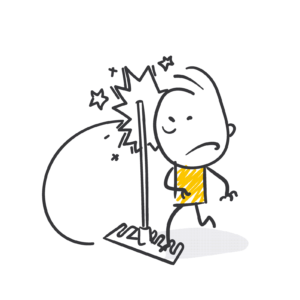Still putting off your estate planning? I hope that after reading my last blog article you are starting to think more about getting started with your Florida estate planning.
Last week, I talked about the first two reasons why you should have an estate plan in place:
1) to avoid probate; and
2) to ensure your family and loved ones inherit your assets after you pass away.
In this week’s article, I discuss two additional reasons to have a plan in place: to ensure that proper medical, financial, and legal decisions are made on your behalf during your incapacity and to ensure that your minor children are raised and cared for by people you want in the event you (and/or your spouse) become incapacitated or pass away.
3. You Have No Control Over Your Medical, Financial, or Legal Decisions in the Event of Your Incapacity
Most people assume estate planning comes into play only after they pass away, but that is dead wrong (pun intended). Although planning for your eventual death is a big part of the process, it is just as important—if not more so—to plan for your potential incapacity due to accident or illness. Incapacity is when your doctors (or a disability panel selected by you) have determined that you are unable to care for and make decisions for yourself while you are still alive.
If you become incapacitated and have no plan in place, your family would have to petition a court to appoint a guardian or conservator to manage your affairs. This process can be extremely costly, time consuming, and traumatic for everyone involved. In fact, incapacity can be a much greater burden for your loved ones than your death.
We can help you get documents in place that give legal authority to the person(s) of your choice to make medical, financial, and legal decisions on your behalf in the event of your incapacity. We can also implement planning strategies that provide specific guidelines detailing how you want your medical care to be managed, including critical end-of-life decisions.
We call these set of documents your Advance Healthcare Directives and they allow you to determine how you will be cared for and what medical services you want provided to you if you are unable to communicate during your incapacity. Without Advance Healthcare Directives, your doctors will go to your family (or friends if your family cannot be reached or found) and ask them what they want done to you during your incapacity. This takes the decision making out of your hands and puts it into the hands of people you may not trust to make those important medical decisions to your body.
4. You Have No Control Over Who Will Raise Your Children
Estate planning allows you to control how you want to be cared for and it also allows you to determine how to protect your minor children if you (and/or your spouse) are unable to care for them yourself.
The most devastating consequence of having no estate plan for parents of minor children is what could happen to your kids in the event of your death or incapacity. Without a plan in place that names legal guardians for your kids, a judge will decide who takes your kids into their custody.
While you may think that a judge would select the best person to care for your kids, it does not always work out that way. For example, the judge could pick someone from your family whom you would never want to raise your kids to adulthood. In most cases, the judge has never met you, your kids, or anyone else in your family. The judge only knows what they see on paper and what they hear from each family member during the guardianship proceeding. Additionally, if you do not have any family, or the family you do have is deemed unfit, your children could be raised by total strangers (i.e., foster care).
Furthermore, if you have several relatives who want to care for your kids, they could end up fighting one another in court over who gets custody. This can get extremely ugly, as otherwise well-meaning family members fight one another for years, making their lawyers wealthy, while your kids are stuck in the middle. While this fighting takes place in court, your kids may be living in a temporary foster care home waiting for the judge to decide where they will live next.
In the event you are involved in an accident or traumatic event, you need a plan to temporarily keep your kids out of the care of strangers while the authorities figure out what to do if you are incapacitated or dead.
With all this this in mind, if you have minor children, your number-one planning priority should be naming both short- and long-term legal guardians to care for your children if anything should happen to you. Because this is so critical, we developed a comprehensive system called the For The Kids Plan™, where we guide you step-by-step through the process of creating the legal documents naming these guardians for your minor children.
While a judge is always required to finalize the legal naming of guardians in the event of death or incapacity of parents, you need to give the judge clear direction, and creating legal documents that name the legal guardians of your choosing will do just that.
Work with us
At Jacob & Greenfield, PLLC, we will personally guide you through the planning process to ensure you take all the necessary precautions to spare your loved ones from needless frustration, conflict, and expense. Additionally, putting a proper plan in place will give you the peace of mind that comes from knowing your loved ones will be provided and cared for no matter what happens to you.
Schedule a no-cost initial consultation with us, so you can finally check this important task off your to-do-list.









